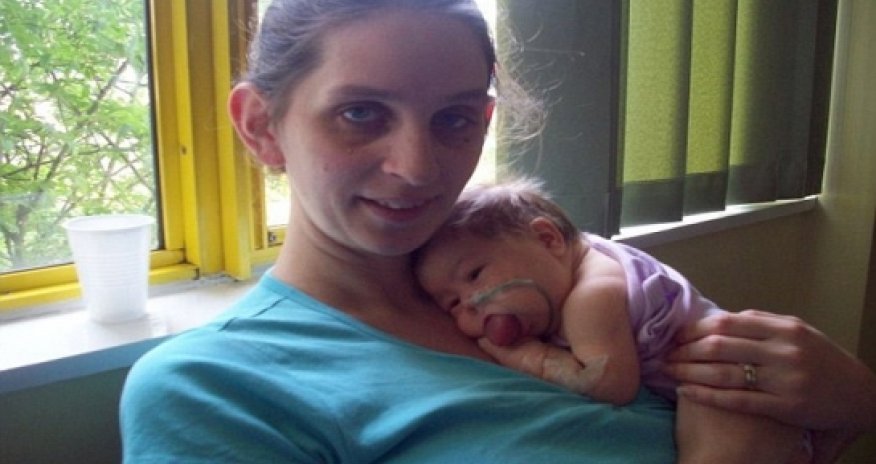Little girl whose TONGUE wouldn't stop growing - PHOTO

A little girl born with a rare genetic condition which caused her to be born with an over-sized tongue is preparing to start school after three pioneering operations to correct the problem.Olivia Gillies was born with Beckwith-Wiedemann syndrome (BWS), which affects one in 15,000 babies born in the UK.Her mother Emma, 29, and father Ian, 40, were shocked when they discovered their unborn daughter's condition during a routine scan.But four years later the couple are preparing to wave Olivia off for her first day at primary school, after the youngster had three operations to reduce the size of her tongue.Mrs Gillies, of Welwyn Garden City, said: 'When Olivia was born I had less than a minute to hold her before she was rushed through to special care. 'It was difficult to be separate from her in those first hours, seeing the other parents on the maternity ward with their children.'Ian kept running between the wards, showing me pictures of her. I finally got to hold her eight hours later.'Her tongue was protruding from her mouth, but I wasn’t shocked. I loved her instantly.'Olivia’s BWS was diagnosed after a scan at the Lister Hospital in Stevenage when Mrs Gillies was around seven months pregnant.Mrs Gillies, a former admin assistant who has four other children, Amy, 15, Tiernan, 13, Hayden, six and Mia, three, said: 'They could see her protruding tongue on the scan. 'We were told it was an overgrowth disorder - parts of Olivia’s body, including her internal organs, would be larger than normal.'I went home and searched online for BWS. It wasn’t a very good idea, and it left me quite shocked. Information on websites often focuses on worst-case scenarios.'Beckwith-Wiedemann syndrome is a rare disorder caused by an imbalance in the genes governing growth rates.Sufferers can experience problems with abdominal wall tissue, enlarged tongues, enlarged limbs and, in some cases, hearing loss and heart disorders.Mrs Gillies and her husband, a chef, were allowed to take Olivia home on the understanding she would need operations to reduce the size of her tongue while she was still a baby.She said: 'When we brought her home our other children were over the moon. They were so happy to have their little sister with them for the first time.'Unfortunately I couldn’t breast-feed her. She had to be fed by a tube for a long time. There were concerns that the tongue would cause problems with her breathing, so we were quite cautious.'We took Olivia to a check-up appointment at Great Ormond Street when she was 15 weeks old and a cranio-facial consultant was concerned enough to admit her to a ward urgently.'Olivia eventually underwent her first tongue reduction operation in September 2010, when she was six months old.Mrs Gillies said: 'By then her tongue was so large it was covering her chin. We knew she would need an operation eventually, but we didn’t know she would also need a tracheostomy.'To hear she would need such help to breathe came completely out of the blue and we were quite shocked.'She coped fine after the operation. She was already being fed through a tube so, unlike other children who have been through the operation, she didn’t have to cope with eating with stitches on her tongue.'We kept up with her painkillers and she got through it fine.'Despite early hopes that a single operation would be enough to correct the problem, Olivia required two more operations in March 2011 and March 2012 before doctors were confident her tongue would develop normally.In October 2012, Olivia’s tracheostomy was repaired and today she eats and breathes unaided.Mrs Gillies said: 'She was a little late walking and she is still learning to talk properly - family members can understand but strangers sometimes struggle to follow her. But she is hitting all her milestones more-or-less as expected.'We’ve always been a close family, and we helped to keep each other calm during moments when we weren’t clear on how things were going to turn out for Olivia. 'I’ve also found good support on Facebook among families of other children with the condition, although it’s extremely rare for a child to have BWS and require a tracheostomy, as she did.'She’s extremely cheerful and loves playing with her brothers and sisters. She’s doing amazingly well at school, and has got lots of friends.'After everything that happened, she’s a very happy child.'(dailymail.co.uk)Bakudaily.az
Similar news
Similar news




































 Photo
Photo 



 Video
Video 

